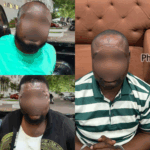
October is recognised as National Depression Awareness Month in the United States, while October 10 marks World Mental Health Day.
Although I don’t live in the US, I’ve chosen to use this month as a reminder to talk about what it’s like living with chronic depression, specifically Persistent Depressive Disorder (PDD)—also known as dysthymia.
Let’s get the technical part out of the way. PDD is a continuous, long-term form of depression. You may feel sad and empty, lose interest in daily activities, and struggle to get things done. You may also have low self-esteem, feel like a failure, and carry a sense of hopelessness. These feelings can last for years—sometimes, for life.
I want to share what it’s like living with this condition—to take you through a typical day in my life, how it feels in my head and in my skin. You still may not fully understand, but perhaps this glimpse might help someone out there.
I wake up at 4:30 a.m. because I live on the outskirts of Accra. I used to jump out of bed the moment the alarm rang, but now it takes me a while. I sit at the edge of the bed, breathing deeply, staring out the window, trying to steady myself as anxiety crawls over my skin and the heaviness in my chest grows.
Eventually, I move—unlocking the main door so the housekeeper can get in—and pack my gym bag, handbag, and computer bag. Then, at 5 a.m., I wake my son.
I have three methods: I either tickle him, sing loudly, or say, “Yo, it’s time to wake up; we’re running late!” It depends on my mood. He’s an instant waker—energy floods his body as soon as his eyes open.
I leave him to his rituals and head back to my room to change from my pajamas into gym clothes. This is when I really drag my feet. I sit on my bed for long minutes, drowning in heaviness and thoughts. Sometimes I lie back down.
When my son comes in to borrow tissue or something from my bathroom, he chastises me for still being in bed. I grumble something inaudible. Eventually, I turn on YouTube for “Daily Effective Prayer.” If he’s ready, he joins me to pray. I try not to skip it—but some mornings, the weight is too much, and I stay under the covers, unable to step into the world.
We get into the car between 5:30 and 5:45 a.m. Thankfully, I have a driver. If my son’s chatter quiets, I sleep—or at least pretend to. It’s not real rest; it’s grief and fear forcing me to retreat.
I think about all I’ll face that day—and that I’ll face it alone, as always.
We drop my son off at school between 6:00 and 6:15 a.m. It sounds early, but there are other kids there. We’re in silent competition with a man I call “Daddy Warbucks”—he drives a fancy Lexus and drops his kids off even earlier.
I give my son his medicine at school, since it’s after meals, and he eats breakfast in the car. We used to hug, but now he’s outgrown that—though sometimes, I still get one.
Afterwards, I nap again on the way to pick up my mom for the gym and again until we arrive.
At the gym, I’m all smiles—dapping with the bros, teasing, laughing. I doubt anyone there could imagine I have depression. But I hate the mirrors. There are none at home, so the gym is my first daily encounter with them. They reflect every ounce of self-loathing I try to hide.
And that’s why I push harder. Would I rather lift lighter weights? Of course. But I can’t be fat and weak at the same time. So even if the mirror shows a fat person, it at least shows one lifting heavy.
Then I swim—the one time I feel free. There are no mirrors at the pool. I swim in peace. I’m a good swimmer—and maybe that’s the one place I truly feel calm.
After the gym, I shower and change at my mom’s house. The mask comes on. I have to be chatty and engaging; otherwise, there’ll be too many questions.
But in my old room, as I change, I sit on the bed for ages—frozen, grieving, exhausted. I don’t want to talk. I don’t want to smile. I’m surrounded by people, yet I feel completely alone.
At work, everyone knows I’m an introvert. I don’t hop from office to office socialising. I greet, smile, and stay polite—then get to work.
When I facilitate training, I dig deep, like I’m digging for water in the Sahara, cracking jokes, and being amiable. My performing mask is strong—impeccable. No one sees the storm underneath
After work, I pick up my son, and the chatter begins again. At home, we do homework, then head to our small gym. I walk or cycle; he trains with the security guard.
Training time is our bonding time. I tell him I’m his assistant coach. He rolls his eyes, and I tell him, “All great athletes had their mothers in the picture somewhere!”
Then we eat dinner, he showers, and after prayers, he goes to bed.
And then, oh baby—it all comes crashing down. The day wraps itself around my throat like a vise. I sit on the floor, rocking myself back and forth like a child.
The self-hate, the grief, the sadness, the abandonment, the feeling of failure—they all pile on. I replay everything: the things I said wrong, what others said that hurt, and every moment I could have done better.
I ask myself, “Why can’t I just be okay? Why can’t I just snap out of it? Why can’t I just choose happiness?”
Then it’s medication time. Topiramate for seizure disorder—a recent diagnosis I’m still grappling with. Rivotril and Renerve Plus for the same. Citalopram for depression. Propranolol for anxiety and panic attacks. Melatonin to help me sleep.
What a cocktail.
But it’s not just seizure disorder, chronic depression, and anxiety. I also live with complex trauma and borderline personality disorder (quiet type). That’s a whole other story for another time.
And as I take the pills, the cruel thoughts come: “See, this is why he left you. You’re too much. Your body is broken. Your mind is broken. You are broken. Who can deal with this?”
Before bed, I record my BG365 post for social media. Every time I do, I feel like a hypocrite. Deep down, I want to say, “Guys, I’m deeply and profoundly sad. I don’t think I’ll ever recover.”
But I don’t. I chose something more neutral because I don’t want to worry anyone. People think I share a lot—gosh, I barely share. What they see is just the tip of the iceberg.
Sometimes I use filtered photos because I hate how I look. My depression is tangled with body image issues, past trauma, heartbreak, and the feeling that I’m not where I should be in life.
Eventually, I post—authentic, but not the full truth. Then I shower and lie in bed, exhausted, crying, unseen, abandoned.
As I drift, I imagine my ex cuddled up with someone else, while I’m here—broken, damaged, and never enough.
Then I pray. I surrender to God. But I know I’ll wake up again at 4:30 a.m., and the cycle will begin all over—despite therapy, medication, and prayer.
YouTube, Instagram, Facebook, Twitter, LinkedIn: @boakyewaaglover
TikTok: @boakyewaa.glover



